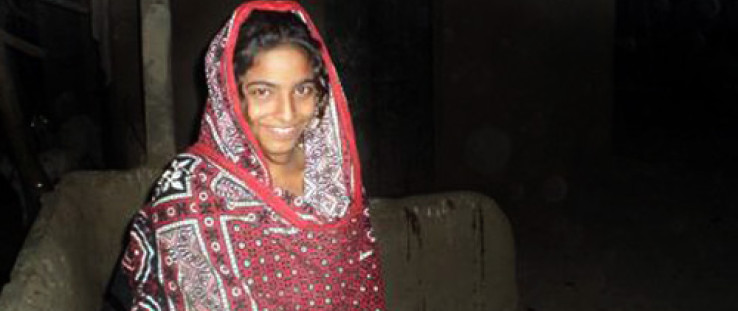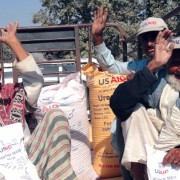 Bakhtawar will be able to grow up and finish school before she is married.
Wasif Rashid
Bakhtawar will be able to grow up and finish school before she is married.
Wasif Rashid
 Bakhtawar will be able to grow up and finish school before she is married.
Wasif Rashid
Bakhtawar will be able to grow up and finish school before she is married.
Wasif Rashid
KANJEER, Pakistan—Bakhtawar Abdullah was a good student in the fifth grade at the small school located in this southern Pakistan village.
She enjoyed learning, laughing with her friends, and spending time with her family. But one evening, as she sat nervously in a chair beside her parents at the local meeting hall, she knew that everything about her childhood was about to come to an end.
No more school, no more girlfriends, no more fun. At 15, Bakhtawar was to become engaged to be married.
But just as the betrothal ceremony was about to begin, a prominent man in the village walked into the hall followed by his wife, Jinnah. The room quieted down as the man approached Bakhtawar and her parents. He stopped in front of them and spoke.
"This girl is not mentally or physically ready for marriage and motherhood," he told the wide-eyed parents. "You must wait for three years, until she is 18, before she gets married."
The man, Muhammad Asif Soomro, was a member of the local village council and an influential member of the community. Jinnah, a community activist herself, seconded her husband's decree.
Participants at the ceremony, including village elders and parents of the soon-to-be bride and 18-year-old groom, all listened intently as Soomro explained the negative impact that early motherhood would have on the girl's health and well-being for the rest of her life.
The guests were completely unaware of the dangers Soomro described, but ultimately were convinced that the marriage, and others involving such young brides, should be postponed. Accompanied by other village elders, Soomro made a second visit to the families of the betrothed, and both sets of parents confirmed their willingness to postpone the marriage.
In traditional agrarian communities in Pakistan, a woman's prime role in life is to be a mother. To assure the maximum number of fertile years to have children, fathers, especially heads of poor families, marry their daughters off straight after puberty.
Soomro may not have taken issue with the betrothal at all were it not for his role as a community volunteer in a neighboring district for a USAID program called Family Advancement for Life and Health (FALAH).
In the next few months, FALAH will train more than 1,600 community-based volunteers across Pakistan, spreading the word that not only do early and unspaced pregnancies leave girls vulnerable to reproductive health problems, but early marriage also deprives girls of the chance for an education.
Physically, girls who marry before age 18 have a higher incidence of maternal mortality and miscarriage. Deprived of education, they are less aware of issues surrounding their own reproductive health, and their emotional immaturity can lead to abusive relationships with their spouses.
Soomro had recently returned from a training session in a town neighboring Thatta, the district capital, encouraging volunteers to spread important messages about the severe, long-term health risks of early teenage pregnancy.
"We did not realize the consequences of early-age pregnancies," said Abdullah, Bakhtawar's father, who uses only one name. "We do not want our daughter to face any complications having a child too young, so we have decided to postpone the marriage."
Although Pakistan accepted the United Nations Convention on the Rights of the Child prohibiting child marriages in 1990, and current law forbids marriage before a girl is 16, it is rarely enforced, especially in rural areas. Communities are often not even aware of the risks involved with early marriage and motherhood.
"I didn't expect to effect such a change in my community so quickly," Soomro said. "But the elders came to agree with me completely. There will be no more marriage for our girls until they have reached a mature enough age."
The impacts of early marriage are substantial not just for young women, but their children as well: Infants born to mothers younger than 20 face a higher risk of death shortly after birth up to age 5 than those born to older mothers.
The evening of Soomro's intervention, Bakhtawar beamed when she learned that she could finish her schooling—and finish growing up before becoming a wife and mother. With 11 siblings, she understood the financial reasons why her parents supported the marriage, but was nonetheless grateful for the delay.
"I have seven sisters and four brothers," Bakhtawar said. "Because we are very poor, my parents wanted me to get married as early as possible, but I was not ready. Now I can go back to school."
Bakhtawar is not the only girl in Kanjeer who will get a reprieve from child marriage. Soomro said that the decisive reaction by the two families to his advice has inspired him to deliver additional messages he learned at the training to other parents in the village, such as the importance of pre-natal care for pregnant women, a trained birth attendant at all deliveries, and proper birth spacing.









Comment
Make a general inquiry or suggest an improvement.